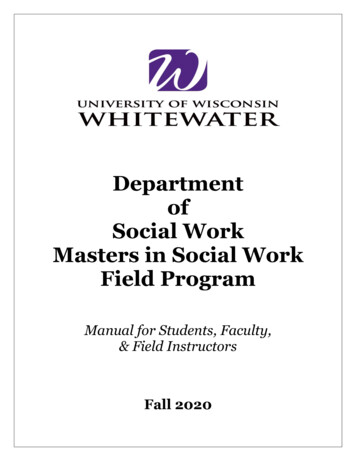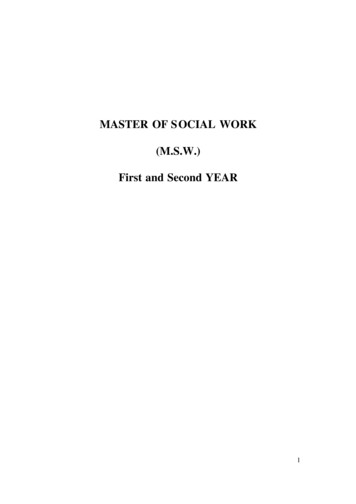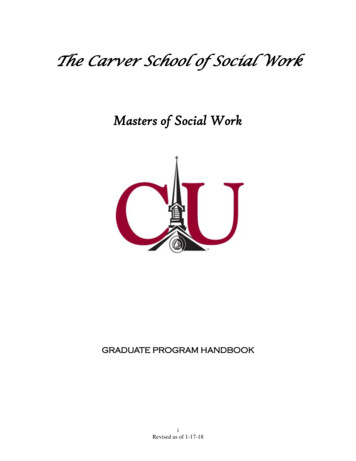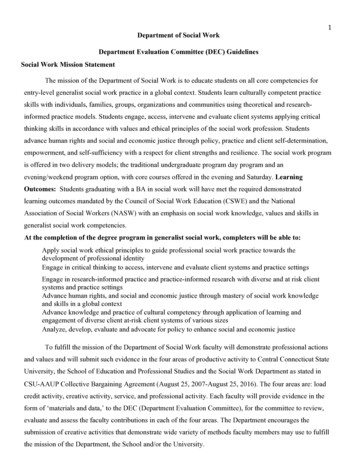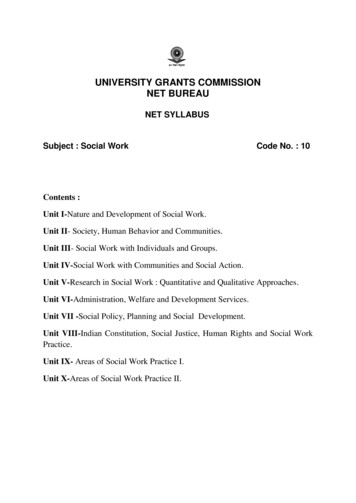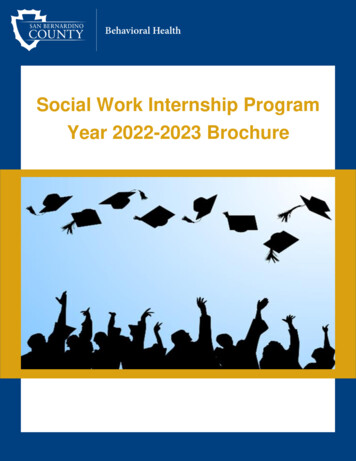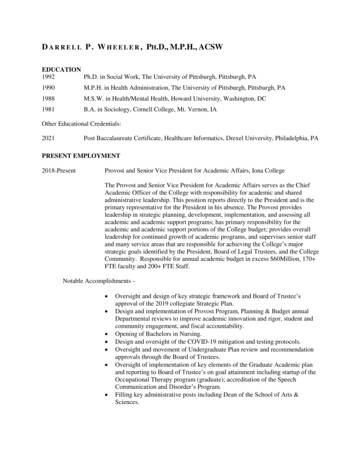
Transcription
Department of Social WorkSWK 2307-010Introduction to Social WorkSpring Semester 2022Archer College ofHealth and HumanServicesInstructor: Tom Starkey, Ph.D., LCSWEmail: tstarkey@angelo.eduPhone: 325.486.6130Office: HHS 224JStudent Hours: T/TR: 0900-1100 and Monday: 1100-1400Course InformationCourse DescriptionAn overview of the history and development of social work as a profession. The course is designed tofoster a philosophical, historical, and critical understanding of the social work profession, social workvalues and ethics, and fields of practice.Course Credits3 credit hoursPrerequisite and Co-requisite CoursesSWK 2307Prerequisite SkillsAccessing Internet websites, using ASU Library resources, and proficiency with Microsoft Word and/orPowerPoint are expectations of the Department of Social WorkProgram OutcomesUpon completion of the program of study for the MSW program, the graduate will be prepared to:Competency 2: Engage Diversity and Difference in Practice. Social workers understand how diversityand difference characterize and shape the human experience and are critical to the formation ofidentity. The dimensions of diversity are understood as the intersectionality of multiple factors includingbut not limited to age, class, color, culture, disability and ability, ethnicity, gender, gender identity andexpression, immigration status, marital status, political ideology, race, religion/spirituality, sex, sexualorientation, and tribal sovereign status. Social workers understand that, as a consequence of difference,a person’s life experiences may include oppression, poverty, marginalization, and alienation as well asprivilege, power, and acclaim. Social workers also understand the forms and mechanisms of oppressionand discrimination and recognize the extent to which a culture’s structures and values, including social,economic, political, and cultural exclusions, may oppress, marginalize, alienate, or create privilege andpower. Competency 7: Assess Individuals, Families, Groups, Organizations, and Communities. Socialworkers understand that assessment is an ongoing component of the dynamic and interactive process ofsocial work practice with, and on behalf of, diverse individuals, families, groups, organizations, andcommunities. Social workers understand theories of human behavior and the social environment, and
critically evaluate and apply this knowledge in the assessment of diverse clients and constituencies,including individuals, families, groups, organizations, and communities. Social workers understandmethods of assessment with diverse clients and constituencies to advance practice effectiveness. Socialworkers recognize the implications of the larger practice context in the assessment process and valuethe importance of inter-professional collaboration in this process. Social workers understand how theirpersonal experiences and affective reactions may affect their assessment and decision-making.Competency 8: Intervene with Individuals, Families, Groups, Organizations, and Communities. Socialworkers understand that intervention is an ongoing component of the dynamic and interactive processof social work practice with, and on behalf of, diverse individuals, families, groups, organizations, andcommunities. Social workers are knowledgeable about evidence-informed interventions to achieve thegoals of clients and constituencies, including individuals, families, groups, organizations, andcommunities. Social workers understand theories of human behavior and the social environment, andcritically evaluate and apply this knowledge to effectively intervene with clients and constituencies.Social workers understand methods of identifying, analyzing and implementing evidence-informedinterventions to achieve client and constituency goals. Social workers value the importance ofinterprofessional teamwork and communication in interventions, recognizing that beneficial outcomesmay require interdisciplinary, interprofessional, and inter-organizational collaboration.Student Learning OutcomesStudent Learning OutcomeBy completing all courserequirements, students will beable to:Assignment(s) oractivity(ies) validatingoutcome achievement:use reflection and self- regulation to managepersonal values andmaintain professionalismin practice situationsGroup Power PointPresentation &Examinationsapply and communicate understanding of theimportance of diversity and difference in shaping lifeexperiences in practiceat the micro, mezzo, andmacro levelsapply their understanding of social, economic, andenvironmental justice to advocate for human rightsatthe individual andsystem levelsGroup Power PointPresentation &Examinationsuse and translate researchevidence to inform andimprove practice, policy, and service deliveryGroup Power PointPresentation &ExaminationsGroup Power PointPresentation &ExaminationsMapping to ProgramOutcomesCompetency 1:DemonstrateEthical andProfessionalBehaviorCompetency 2:Engage Diversityand Difference inPracticeCompetency 3:Advance HumanRights and Social,Economic, andEnvironmentalJusticeCompetency 4:Engage inPracticeinformedResearch andResearchinformed Practice
Course DeliveryThis is an online course offering. The course will be delivered via the Blackboard Learning ManagementSystem. The course site can be accessed at ASU's Blackboard Learning Management SystemRequired Texts and MaterialsKirst-Ashman, K. K. (2017). Introduction to social work and social welfare: Critical thinking perspectives.(5th ed.). Belmont, CA: Brooks/Cole.ISBN: 978-1-3053-8839-0Recommended Texts and MaterialsAmerican Psychological Association. (2019). Publication manual of the American PsychologicalAssociation (7th ed.). Washington, DC: APA. ISBN: 978-1-433-83216-1NOTE: All assignments submitted in this course are to be written in strict accordance with the PublicationManual of the American Psychological Association (7th ed.).Technology RequirementsTesting via Respondus MonitorAccess to Exams will be through Respondus Lockdown Browser and will be video recorded viaRespondus Monitor [See Other Required Materials for a list of needed equipment]. Use of anotherelectronic device is prohibited.There is one practice quiz: a short 10 question practice quiz over ASU trivia that is not graded. Thistool will be available to the student to assure accessibility. Students are highly encouraged to gothrough the practice quiz in advance of taking a graded quiz. This process will allow you to becomefamiliar with the technology associated with testing and improve the testing environment. Thesequizzes, instructional videos, and more information regarding Respondus Monitor can be foundunder the Respondus Monitor Help tab in your Blackboard course.To participate in one of ASU’s distance education programs, you need this technology: A computer capable of running Windows 7 or later, or Mac OSX 10.8 or laterThe latest version of one of these web browsers: internet Explorer, Firefox, or SafariMicrosoft Office Suite or a compatible Open Office SuiteAdobe Acrobat ReaderHigh Speed Internet AccessEthernet adapter cable required (wireless connections can drop during tests and Collaboratesessions)WebcamRefer to Angelo State University’s Distance Education website for further technology requirements:Angelo State University's Distance Education WebsiteTopic OutlineModule 1: Includes chapters 1-4 and discusses an introduction to social work, social work values and
ethics, empowerment and human diversity, and the process of generalist practice.Module 2: Includes chapters 5-8 and this module looks at practice settings; overview of social welfareand social work history; policy analysis, practice, and advocacy; and policies and programs to combatpoverty.Module 3: Includes chapters 9-12 and looks at social work services for children and families, social workservices for older adults, social work services for people with disabilities, and social work and healthcare.Module 4: Includes chapters 13-16 and discusses social work and mental health, social work andsubstance abuse, social work for youths and school, and social work in the criminal justice system.CommunicationFaculty will respond to email and/or telephone messages within 24 hours during working hours Mondaythrough Friday. Weekend messages may not be returned until Monday. Please note that emails received after 6 p.m. will be answered the following morning.Written communication via email: All private communication will be done exclusively through your ASUemail address. Check frequently for announcements and policy changes. In your emails to faculty,include the course name and section number in your subject line.Virtual communication: Office hours and/or advising may be done with the assistance of the telephone,Collaborate, Skype, etc.GradingEvaluation and GradesCourse grades will be determined as indicated in the table below.AssessmentPercent/Points of Total GradeProfessional Performance10%Resume and Personal Narrative25%Group Power Point Presentation25%Examinations40%Total100%Grading SystemCourse grades will be dependent upon completing course requirements and meeting the studentlearning outcomes.The following grading scale is in use for this course:A 90.00-100 pointsB 80.00-89.99 pointsC 70.00-79.99 pointsD 60.00-69.99 pointsF 0-59.99 points (Grades are not rounded up)
Teaching StrategiesStudents are expected to be “active learners.” It is a basic assumption of the instructor that students willbe involved (beyond the materials and lectures presented in the course) discovering, processing, andapplying the course information using peer-review journal articles, researching additional informationand examples on the Internet, and discussing course material and clinical experiences with their peers.Assignment and Activity Descriptions*Please note: Rubrics for all assignments and activities are located at the end of this syllabus.Professional Performance10%This is relevant to attendance; engaging in class activities, including frequency and quality; professionalpresentation; and so forth. An expectation of a professional social worker is that they are present intheir practice setting. The expectation for students in a social work program is that they are motivatedto learn and have a sense of dedication to their studies. Thus, myexpectation of you is that you will bepresent in class. Class begins and ends at the scheduled time.Students are to be present for the duration of class. It is expected that all other demands of your timework, family, appointments, other courses, etc. will be negotiated. Students will be requested their fullpresence in class, physical and intellectual presence.Examinations40%There will be four (4) online, multiple attempt (two), timed (75 mins), examinations in this course. Youwill not be allowed to use books, notes, ppts, or any other type of assistive materials.Each of theseexaminations is worth 10% of your total course grade. You will take each of these examinations viaBlackboard using the Respondus LockDown browser.Resume and Personal Narrative25%Each student will write a resume in this course; students are encouraged to seek assistance from thecareer development center (UC 114) on campus in completing this assignment. Additionally, eachstudent will complete a personal narrative, at least five pages in length (the paper can be longer ifnecessary) including cover sheet and references (references are expected) covering the followingsections conforming to the standards of the Publication Manual of the American PsychologicalAssociation, 6th Edition (2010):1. your understanding of the social work profession (including its historical development,mission, and values) and how the social work profession is similar to and differentiatedfrom sociology, psychology, psychiatry, and counseling;2. list and define all six core values of the social work profession; discuss the relationshipof these core values to the NASW Code of Ethics; choose at least two of the core valuesof the social work profession and discuss their importance to you and the social workprofession;3. discuss why you desire to enter the social work profession; include a discussion of thefollowing: your personal identification with the social work profession; the ecological
paradigm (person-in environment perspective, biopsychosocial approach to clients),advocacy for client access to social work services, your conceptualization andappreciation of human diversity, and generalist social work practice;4. discuss three of your personal strengths and three of your personal weaknesses orchallenges covering the following points;a. how your personal strengths will help you become a professional social worker;andb. how you plan to overcome any personal weaknesses or challenges to become aprofessional social worker; and5. discuss your future goals as a professional (e.g., graduate work in social work, socialwork employment, social work career path, career-long learning plan, and so forth).Group Power Point Presentations25%Each student will be assigned to a group and the group will select a chapter from the textbook to present apower point presentation.The power point presentation should cover the following:1. The nature of the particular area of social work practice.2. The role and function of social workers in that particular area of social work practice onthe micro and macro levels of practice.3. Related professional organizations; degree level, licensure, and/or certification requiredfor practice in the particular area; and salary.Students will be awarded a grade based on the quality of presentation, information provided, use ofAPA, and relevance of PowerPoint Slides.Students are required to notify the instructor of the topic each intends to discuss by the date identifiedin the Syllabus.Assignment SubmissionAll assignments MUST be submitted through the Assignments link in the Blackboard site. This is forgrading, documenting, and archiving purposes. Issues with technology use arise from time to time. If atechnology issue does occur regarding an assignment submission, email me at tstarkey@angelo.eduand attach a copy of what you are trying to submit. Please contact the IT Service Center at (325) 942-
2911 or go to your Technology Support tab to report the issue. This lets your faculty know youcompleted the assignment on time and are just having problems with the online submission feature inBlackboard. Once the problem is resolved, submit your assignment through the appropriate link. Thisprocess will document the problem and establish a timeline. Be sure to keep a backup of all work.Late Work or Missed Assignments PolicyPOLICY ON LATE OR MISSED ASSIGNMENTSThe course is set up on weekly modules. The week begins on Monday and ends on Sunday. Assignmentdue dates are shown on the calendar/schedule or posted within Blackboard. Failure to submit yourassignments on the assigned date will result in a 10 point deduction for the first day and a 5 pointdeduction for each day after the posted deadline. No papers or postings will be accepted more than 5days past the assigned due date.General Policies Related to This CourseAll students are required to follow the policies and procedures presented in these documents: Angelo State University Student Handbook1Angelo State University Catalog2Student Responsibility and AttendanceThis class is asynchronous, meaning you do not have to be on-line at a certain time. There are readingswhich you will have to complete to be able to adequately participate in individual and groupassignments. In order to complete this course successfully, you do have to participate in all courseactivities i.e. discussion boards, course projects, reflective logs, etc. Students are expected to engage incourse activities and submit work by due dates and times. The hope is that students will makesubstantive contributions which reflect integration of assigned materials as well as any outside readingsas appropriate. Scholarly contribution is an expectation. For planning purposes, this class will probablyrequire a minimum of 6-9 study hours per week on average.Note: This course utilizes Collaborate to engage in role plays, case study, and interaction. A day and 2session times will be offered for students to have some flexibility. Attendance is mandatory. Collaboratetimes will be posted in Banner and a reminder email will be sent the day of the sessions.Academic IntegrityStudents are expected to maintain complete honesty and integrity in all work. Any student found guiltyof any form of dishonesty in academic work is subject of disciplinary action and possible expulsion fromASU.The College of Health and Human Services adheres to the university’s Statement of Academic Integrity.3Accommodations for Students with DisabilitiesASU is committed to the principle that no qualified individual with a disability shall, on the basis ofdisability, be excluded from participation in or be denied the benefits of the services, programs oractivities of the university, or be subjected to discrimination by the university, as provided by the
Americans with Disabilities Act of 1990 (ADA), the Americans with Disabilities Act Amendments of 2008(ADAAA) and subsequent legislation.Student Disability Services is located in the Office of Student Affairs, and is the designated campusdepartment charged with the responsibility of reviewing and authorizing requests for reasonableaccommodations based on a disability. It is the student’s responsibility to initiate such a request bycontacting an employee of the Office of Student Affairs, in the Houston Harte University Center, Room112, or contacting the department via email at ADA@angelo.edu. For more information about theapplication process and requirements, visit the Student Disability Services website.4 The employeecharged with the responsibility of reviewing and authorizing accommodation requests is:Dallas SwaffordDirector of Student Disability ServicesOffice of Student on Harte University Center, Room 112Incomplete Grade PolicyIt is policy that incomplete grades be reserved for student illness or personal misfortune. Please contactfaculty if you have serious illness or a personal misfortune that would keep you from completing coursework. Documentation may be required. See ASU Operating Policy 10.11 Grading Procedures5 for moreinformation.PlagiarismPlagiarism is a serious topic covered in ASU’s Academic Integrity policy6 in the Student Handbook.Plagiarism is the action or practice of taking someone else’s work, idea, etc., and passing it off as one’sown. Plagiarism is literary theft.In your discussions and/or your papers, it is unacceptable to copy word-for-word without quotationmarks and the source of the quotation. It is expected that you will summarize or paraphrase ideas givingappropriate credit to the source both in the body of your paper and the reference list.Papers are subject to be evaluated for originality. Resources to help you understand this policy betterare available at the ASU Writing Center.7Student Absence for Observance of Religious Holy DaysA student who intends to observe a religious holy day should make that intention known in writing tothe instructor prior to the absence. See ASU Operating Policy 10.19 Student Absence for Observance ofReligious Holy Day8 for more information.Copyright PolicyStudents officially enrolled in this course should make only one printed copy of the given articles and/orchapters. You are expressly prohibited from distributing or reproducing any portion of course readingsin printed or electronic form without written permission from the copyright holders or publishers.
Syllabus ChangesThe faculty member reserves the option to make changes as necessary to this syllabus and the coursecontent. If changes become necessary during this course, the faculty will notify students of such changesby email, course announcements and/or via a discussion board announcement. It is the student’sresponsibility to look for such communications about the course on a daily basis.Title IX at Angelo State UniversityAngelo State University is committed to providing and strengthening an educational, working, and livingenvironment where students, faculty, staff, and visitors are free from sex discrimination of any kind. Inaccordance with Title VII, Title IX, the Violence Against Women Act (VAWA), the Campus Sexual ViolenceElimination Act (SaVE), and other federal and state laws, the University prohibits discrimination basedon sex, which includes pregnancy, and other types of Sexual Misconduct. Sexual Misconduct is a broadterm encompassing all forms of gender-based harassment or discrimination and unwelcome behavior ofa sexual nature. The term includes sexual harassment, nonconsensual sexual contact, nonconsensualsexual intercourse, sexual assault, sexual exploitation, stalking, public indecency, interpersonal violence(domestic violence or dating violence), sexual violence, and any other misconduct based on sex.You are encouraged to report any incidents involving sexual misconduct to the Office of Title IXCompliance and the Director of Title IX Compliance/Title IX Coordinator, Michelle Boone, J.D. You maysubmit reports in the following manner:Online: www.angelo.edu/incident-formFace to face: Mayer Administration Building, Room 210Phone: 325-942-2022Email:michelle.boone@angelo.eduNote, as a faculty member at Angelo State, I am a mandatory reporter and must reportincidents involving sexual misconduct to the Title IX Coordinator. Should you wish to speak to someone inconfidence about an issue, you may contact the University Counseling Center (325-942-2371), the 24Hour Crisis Helpline (325-486-6345), or the University Health Clinic (325-942-2171).For more information about resources related to sexual misconduct, Title IX, or Angelo State’s policyplease visit: www.angelo.edu/title-ix.Course Syllabus Statement on Required Use of Masks/Facial Coverings by Students in Class At AngeloState UniversityAs a member of the Texas Tech University System, Angelo State University has adopted themandatory Facial Covering Policy to ensure a safe and healthy classroom experience. Current research onthe COVID-19 virus suggests there is a significant reduction in the potential for transmission of the virusfrom person to person by wearing a mask/facial covering that covers the nose and mouth areas.Therefore, in compliance with the university policy students in this class are required to wear amask/facial covering before, during, and after class. Faculty members may also ask you to display yourdaily screening badge as a prerequisite to enter the classroom. You are also asked to maintain safedistancing practices to the best of your ability. For the safety of everyone, any student not appropriatelywearing a mask/facial covering will be asked to leave the classroom immediately. The student will beresponsible to make up any missed class content or work. Continued non-compliance with the Texas TechUniversity System Policy may result in disciplinary action through the Office of Student Conduct.
Course ScheduleWeek/DateTopic/Assignments/Assessments DUECourse IntroductionWeek 1Jan. 18-21Reading: Chapter 1 (Kirst-Ashman)Lecture Topic: Introduction to Social Work and Social WelfareReading: Chapters 2 (Kirst-Ashman)Week 2Jan. 24-28Lecture Topic: Social Work Values and EthicsAssignment: Sign-up for Group Power Point PresentationsReading: Chapter 3 (Kirst-Ashman) 4Week 3Jan. 31-Feb. 4Lecture Topic: Empowerment and Human Diversity and the Process ofGeneralist PracticeExam 1: Chapters 1-4Week 4Feb. 7-11Week 5Feb. 14-18Reading: Chapters 5 (Kirst-Ashman)Lecture Topic: Practice SettingReading: Chapter 6 (Kirst-Ashman)Lecture Topic: An Overview of Social Welfare and Social WorkHistoryReading: Chapter 7 (Kirst-Ashman)Week 6Feb. 21-25Lecture Topic: Policy, Policy Analysis, Policy Practice, and PolicyAdvocacy:Foundations for Service Provision
Week/DateWeek 7Feb. 28-March 4Topic/Assignments/Assessments DUEReading: Chapter 8 (Kirst-Ashman)Lecture Topic: Policies and Programs to Combat PovertyReading: Chapter 9 (Kirst-Ashman)Week 8Lecture Topic: Social Work and Services for Children andFamiliesMarch 7-11Spring Break March 14Exam 2: Chapters 5-8 (Kirst-Ashman)18Week 9March 21-25Reading: Chapter 10 (Kirst-Ashman)Lecture Topic: Social Work and Services for Older AdultsReading: Chapter 11 (Kirst-Ashman)Week 10March 28-April 1Lecture Topic: Social Work and Services for People withDisabilitiesReading: Chapter 12 (Kirst-Ashman) Lecture Topic:Week 11April 4-8Social Work and Health CareExam 3: Chapters 9-12 (Kirst-Ashman)Reading: Chapter 13 (Kirst-Ashman)Week 12April 11-15Lecture Topic: Social Work and Mental Health Assignment: Resumeand Personal Narrative DueReading: Chapter 14 (Kirst-Ashman)Week 13April 18-22Week 14April 25-29Week 15May 2-6Lecture Topic: Social Work and Substance Use, Abuse, andDependenceReading: Chapter 15 (Kirst-Ashman)Lecture Topic: Social Work and Services for Youths and in theSchools andReading: Chapter 16 (Kirst-Ashman)
Week/DateTopic/Assignments/Assessments DUELecture Topic: Social Work and Services in the Criminal JusticeSystemWeek 16:May 9-13Exam 4: Chapters 13-16 (Kirst-Ashman)Grading RubricsStudent Evaluation of Faculty and CourseStudents in all programs are given the opportunity to evaluate their courses and the faculty who teachthem. Evaluations are most helpful when they are honest, fair, constructive, and pertinent to the class,clinical experience, or course. Faculty value student evaluations, and use student suggestions in makingmodifications in courses, labs and clinical experiences.Angelo State University uses the IDEA (Individual Development and Educational Assessment) systemadministered through Kansas State University for all course evaluations. The Office of InstitutionalResearch and Assessment administers IDEA for the entire university, online and has established a policywhereby students can complete course evaluations free from coercion.1. Gaining a basic understanding of the subject (e.g., factual knowledge, methods, principles,generalizations, theories)2. Developing knowledge and understanding of diverse perspectives, global awareness, or othercultures3. Learning to apply course material (to improve thinking, problem solving, and decisions)4. Developing specific skills, competencies, and points of view needed by professionals in the fieldmost closely related to this course5. Acquiring skills in working with others as a member of a team6. Developing creative capacities (inventing, designing, writing, performing in art, music, drama,etc.)7. Gaining a broader understanding and appreciation of intellectual/cultural activity (music,science, literature, etc.)8. Developing skill in expressing oneself orally or in writing9. Learning how to find, evaluate, and use resources to explore a topic in depth10. Developing ethical reasoning and/or ethical decision making11. Learning to analyze and critically evaluate ideas, arguments, and points of view12. Learning to apply knowledge and skills to benefit others or serve the public good13. Learning appropriate methods for collecting, analyzing, and interpreting numerical informationEnd of Syllabus1 https://www.angelo.edu/student-handbook/
2 -integrity.php4 s/5 p7 https://www.angelo.edu/dept/writing center/academic 4206-op-1019-student-absence-for-observance-of
1. your understanding of the social work profession (including its historical development, mission, and values) and how the social work profession is similar to and differentiated from sociology, psychology, psychiatry, and counseling; 2. list and define all six core values of the social work profession; discuss the relationship
